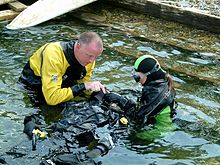
Diver rescue, usually following an accident, is the process of avoiding or limiting further exposure to diving hazards and bringing a diver to a place of safety.[1] A safe place generally means a place where the diver cannot drown, such as a boat or dry land, where first aid can be administered and from which professional medical treatment can be sought. In the context of surface supplied diving, the place of safety for a diver with a decompression obligation is often the diving bell.
Rescue may be needed for various reasons where the diver becomes unable to manage an emergency, and there are several stages to a rescue, starting with recognising that a rescue is needed. In some cases the dive buddy identifies the need by personal observation, but in the more general case identification of the need is followed by locating the casualty. The most common and urgent diving emergencies involve loss of breathing gas, and the provision of emergency gas is the usual response. On other occasions the diver may be trapped and must be released by the rescuer. These first responses are usually followed by recovery of the distressed diver, who may be unconscious, to a place of safety with a secure supply of breathing gas, and following rescue, it may be necessary to evacuate the casualty to a place where further treatment is possible.
Recommended procedures for recovering a disabled or unresponsive scuba diver to the surface have varied over time, and to some extent depend on circumstances and the equipment in use. None are guaranteed to be successful.
In all rescue operations, the rescuer must take care of their own safety and avoid becoming another casualty. In professional diving the supervisor is responsible for initiating rescue procedures, and for ensuring the safety of the dive team. The rescue is generally carried out by the stand-by diver, and for this reason the stand-by diver must be willing and competent to perform any reasonably foreseeable rescue that may be required for a planned diving operation. A similar level of competence is desirable, but not required of recreational divers, who generally have a poorly defined duty of care to other divers, and are usually only trained in rescue and first aid as optional specialties. Nevertheless, recreational divers are usually advised by their training agencies to dive as buddy pairs so they can assist each other if one gets into difficulty.
© MMXXIII Rich X Search. We shall prevail. All rights reserved. Rich X Search
